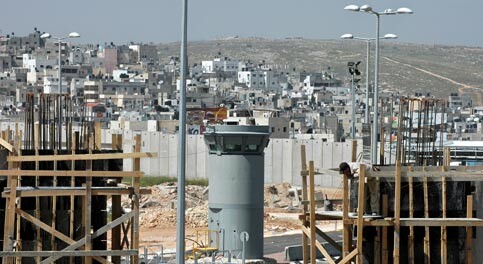The Electronic Intifada 4 May 2006

A general view of the construction site of the Israeli separation wall in Qalandiya between Ramallah and Jerusalem April 30, 2006. (MaanImages/Mushir Abdelrahman)
While the Palestinians are manoeuvring feverishly in reaction to the latest developments dropped in their fishbowl, Israel quietly but forcefully continues its sustained policy of seizing and maintaining control over the West Bank, its land and natural resources.
It is heartbreaking that the Palestinians have no way to stop this policy which continues to take shape inexorably. Certainly, neither the PA nor the Palestinian president is able to do anything whatsoever about Israel’s egregious “low key” actions in the occupied territories. What they are very busily engaged in doing right now — pleading for fulfilment of international obligations to the Palestinians — is pointless in the face of what Israel continues to do to them on a daily basis. They should put all their energies, instead, into finding ways to contain and reverse Israeli military practices that target their land and natural resources.
The monstrosity of the wall is continuing its march through orchards and Palestinian backyards. People living in the proximity of the wall conduct marches and even bravely try to break the metal locks on the gates that keep them out of their agricultural fields, but they are easily beaten back by Israeli rubber bullets and tear gas. Some of them also are “detained”.
When the construction is finished in any particular spot of the 408-mile long wall, people get caught up in trying to cope with the reality of their shrunken space and intolerable confinement. The coping takes up all their energy. Each isolated community must depend on itself; there are no national policies and no strategies to follow in dealing with the terrible social, psychological and economic toll. The PA is distracted from what really matters. Moreover, what’s happening by force needs an equal and opposite force to undo, and that is simply not available to Hamas or to any other Palestinian faction.
The wall marches on and has already separated 200,000 Palestinians from the rest and turned others into refugees for the third time. It has eaten up precious water resources.
Ramallah is now completely separated from Jerusalem. East Jerusalem itself is a tragedy for the Palestinians. As a result of Israel’s sustained policy of discrimination, house demolitions, deprivation and control that is only too well documented, Palestinian residents (those who have not yet been driven out by various ploys) are locked into areas that are already built, where development is restricted. They are totally surrounded by flourishing Jewish neighbourhoods or areas that Israel has zoned as “green areas”, which are made available only for Jewish residential projects.
Up north near Nablus, the Za’tara “checkpoint” is rapidly developing into yet another border that hampers movement in the same way that Kalandia does, separating north from south, east from west. Cement walls encircle Qalqiliya and Tulkarem and people are let in and out of their towns on a regular schedule like some cattle.
At the same time the Palestinian territory is being fragmented by the wall and by major checkpoints with border, Israel is ensuring territorial contiguity among illegal Jewish settlements, some of which industrial sites, all over the West Bank and between them and Israel. It is busy constructing settler-only by-pass roads and other settlement infrastructure at the expense of Palestinians, their land and their livelihoods. For example, around Salfit, Israel has seized twice as much land for its fenced-up settlements as is allocated to the Salfit communities, which have a population almost twice as large as the Jewish settlements.
The Palestinians’ systematic loss of control over their land and their supplies of water has hugely harmed their economy. The economy is under Israel’s thumb in every respect. Israel’s own heavily subsidised products have free entry into Palestinian markets but only a limited number of Palestinian products are allowed into the Israeli market. Complex Israeli administrative procedures and high tariffs discourage Palestinian trade with the rest of the world across borders making the Palestinians, in effect, completely dependent on trade with Israel.
Israel’s pattern of territorial control and obstruction is clearly permanent and is evident at all levels of Palestinian development: social, economic and demographic. The phrase made famous in the American science fiction series Star Trek, “resistance is futile”, comes to mind. Unlike the alien Borg, however, the Israeli forces with their vastly superior technology and arms don’t want to assimilate their opponents; they wish to surround and isolate them.
Because of Israel’s uncompromising policies, there is very little hope for Palestinians.
In “flattening the conflict”, the Israel forces continue to shrink the space for Palestinian day-to-day life. As an Israeli major general has said recently, “the conflict is irresolvable”, and so Israel’s strategy is simply finding ways to live with it, and that means not confrontations with Hamas or any other representatives of the Palestinians, but low-key containment: control, control, control.
The Israelis find ways to “live with” the situation because they have the superior power to do so. The powerless Palestinians, on the other hand, can only die with it.
The author is a Palestinian-American living in Ramallah
Related Links





